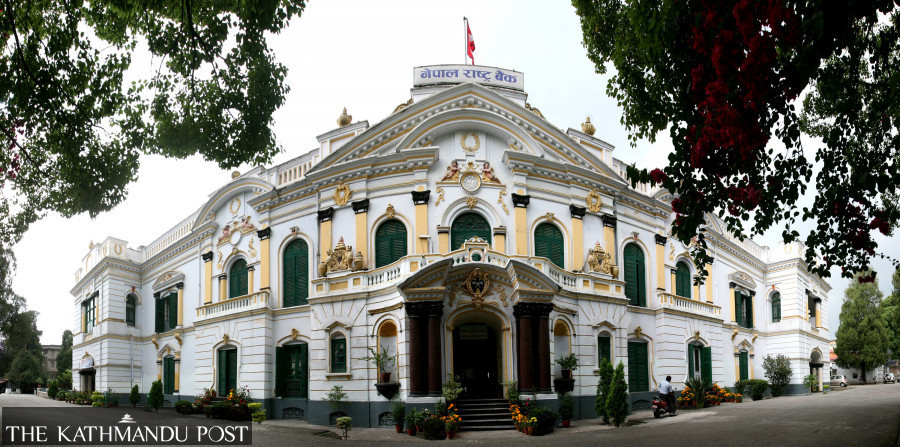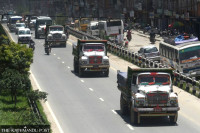National
Banks told to examine climate risks to projects before approving loans
New central bank guidelines require banks to see if a project site falls in an area prone to natural disasters as they can have long-term negative impacts on project operations.
Prithvi Man Shrestha
The Nepal Rastra Bank has instructed banks and financial institutions to assess climate risks like floods, droughts and cyclones to infrastructure and other projects before providing loans for them.
In the revised Guidelines on Environmental and Social Risk Management for Banks and Financial Institutions 2022 unveiled on Sunday, the central bank came up with a checklist on climate risks to projects that banks and financial institutions need to complete before issuing loans.
Although the previous guidelines introduced in 2018 had mention of climate-related risks, there was no separate checklist. The central bank said the new checklist will help banks and financial institutions to assess the risks before financing any projects.
The banks face risks from reduced repayment capacity of clients, reduced value of collateral property, and reputational risk due to negative publicity in the event of the borrower flouting environmental rules, according to the guidelines.
Kiran Pandit, director at the banks and financial institutions regulation department at the central bank, said that the checklist regarding climate change was inserted in the guidelines in line with the Environment Protection Act 2019.
As per the Act, the government is required to conduct studies, on periodic basis, on the adverse impacts caused by climate change on local communities, ecosystems and biodiversity, and publish the findings, as well as issue necessary instructions for the mitigation of adverse impacts and risks of climate change, through sectoral policies, strategies and action plans of all tiers of government.
“In the previous guidelines, we had asked the banking institutions to look into environmental risks before lending,” he said. “Now, we have asked them to look into subtle climate risks as well.”
According to the guidelines, banks and financial institutions are required to see if a project site falls in an area prone to natural calamities such as floods, droughts and cyclones, as they can have long-term negative impacts on project operations.
Some common examples where climatic risks can impact businesses include: droughts affecting agricultural farms, and flash floods affecting hotels, businesses and other establishments and destroying structures and finished goods etc, the guidelines say.
It is important for banks and financial institutions to identify these risks and ascertain that the clients have a disaster management system or business continuity plan in place to deal with such a situation, state the guidelines.
Banks and financial institutions are also required to check if the client has presented the procedures for monitoring, measuring and disclosing greenhouse gases such as carbon dioxide emissions.
“Clients with more than 25,000 metric tons of annual carbon dioxide emission need to report and ideally should have an emission reduction plan,” the guideline says.
Banking institutions have also been advised to see if a client has opted for renewable energy (rooftop solar) or energy efficiency/cleaner production measures such as the use of energy efficient boilers and lights to reduce greenhouse gas emissions.
Banks and financial institutions have also been advised to see whether the client has a robust disaster management plan to combat climate risks and has procedures in place to measure, disclose, set targets and mitigate its greenhouse gas emissions.
If the disaster management plan of the client is not robust, the banking institutions are required to see if there is evidence that the client has intention to measure, disclose, set targets and mitigate its greenhouse gas emissions in near future, according to the guidelines.
Nepal is highly vulnerable to climate change impacts and recent studies by the Asian Development Bank suggested Nepal faces losing 2.2 percent of annual gross domestic product to climate change by 2050.
A new report published in early February in the npj Climate and Atmospheric Science journal revealed that human-induced climate change is causing the highest glacier on Mt Everest to melt at a rapid pace which may lead the South Col Glacier to be completely wiped out by the middle of the current century.
The central bank came up with the guidelines in 2018 to fulfil the conditions set by the World Bank for providing budgetary support to the government, officials at the central bank said.
“One of the conditions of the World Bank to approve ‘Development Policy Credit’ to the government was that the central bank needs to introduce such guidelines,” said Narayan Prasad Pokharel, deputy spokesperson at the central bank.
The development policy credit is a type of loan assistance from the World Bank which the government can allocate in its budget to implement its programmes.
The new guidelines might complicate the loan application process for borrowers. But Pandit says there is no point complaining as it is now mandatory, as per the country’s environmental law, for a borrower/client to ensure that a proposed project has undergone environmental assessment. “The client needs to approach their bank with the same assessment report. We only told the banks to examine the report well before approving loans,” Pandit said.




 21.06°C Kathmandu
21.06°C Kathmandu















